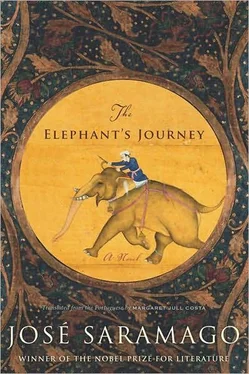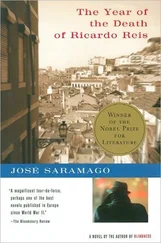TEN DAYS AFTER this conversation, when the sun had barely appeared above the horizon, solomon finally left the enclosure in which he had languished for two years. The convoy was precisely as the king had ordered, with the mahout, who presided from on high, seated on the elephant's back, the two men who were there to help him in whatever way proved necessary, the other men in charge of food supplies, the ox-cart bearing the water trough, which the bumps in the road constantly sent sliding from one side to the other, as well as a gigantic load of fodder of varying types, the cavalry troop who were responsible for security along the way and the safe arrival of all concerned, and, finally, something that the king had not thought of, the quartermaster's wagon drawn by two mules. The absence of curious onlookers and other witnesses could be explained by the extremely early hour and the secrecy that had shrouded the departure, although there was one exception, a royal carriage that set off in the direction of lisbon as soon as elephant and company had disappeared around the first bend in the road. Inside were the king of portugal, dom joão the third, and his secretary of state, pêro de alcáçova carneiro, whom we may not see again, although perhaps we will, because life laughs at predictions and introduces words where we imagined silences, and sudden returns when we thought we would never see each other again. I've forgotten the meaning of the mahout's name, what was it again, the king was asking, White, sir, subhro means white, although you'd never think it to look at him. In a room in the palace, in the gloom of the bed canopy, the sleeping queen is having a nightmare. She is dreaming that solomon has been taken from belem and that she keeps asking everyone, Why didn't you tell me, but when she does finally decide to wake up, around midmorning, she will not repeat that question and cannot be sure that she, on her own initiative, ever will. It may be that in the next few years, someone will chance to mention the word elephant in her presence and then the queen of portugal, catarina of austria, will say, Speaking of elephants, whatever happened to solomon, is he still in belem or has he already been dispatched to vienna, and when they tell her that he is indeed in vienna, living in a kind of zoological garden along with other wild animals, she will respond, feigning innocence, What a fortunate creature, there he is enjoying life in the most beautiful city in the world, and here am I, trapped between today and the future and with no hope in either of them. The king, if he's present, will pretend not to hear, and the secretary of state, the same pêro de alcáçova carneiro whom we have already met, even though he is not a man given to praying, we need only recall what he said about the inquisition and, more important, what he thought best not to say, will offer up a silent prayer to heaven asking for the elephant to be enveloped in a thick cloak of oblivion that will so disguise his shape that he could be mistaken by lazy imaginations for that other strange-looking beast the dromedary, or for some other type of camel, whose unfortunate two-humped appearance would be unlikely to linger in the memory of anyone interested in these insignificant events. The past is an immense area of stony ground that many people would like to drive across as if it were a road, while others move patiently from stone to stone, lifting each one because they need to know what lies beneath. Sometimes scorpions crawl out or centipedes, fat white caterpillars or ripe chrysalises, but it's not impossible that, at least once, an elephant might appear, and that the elephant might carry on its shoulders a mahout named subhro, meaning white, an entirely inappropriate word to describe the man who, in the sight of the king of portugal and his secretary of state, appeared in the enclosure in belem looking every bit as filthy as the elephant he was supposed to be taking care of. There may be some truth in the wise saying that warns us that even the brightest blade grows dim with rust, because that is precisely what had happened to the mahout and his elephant. When they first fetched up in belém, popular curiosity reached astonishing heights and the court itself organized select excursions comprising noblemen and noblewomen, ladies and gentlemen, to view the pachyderm, however, that initial interest soon faded, and the result was plain to see, the mahout's indian clothes were transformed into rags and the elephant's hairs and freckles had almost vanished beneath the crust of dirt accumulated over two years. This is not the case now, however. Although the inevitable dust from the road is already coating his legs from foot to knee, solomon nevertheless walks proudly along, as clean as a new pin, and the mahout, although no longer dressed in colorful indian garb, is resplendent in his new uniform for which, even better, either out of forgetfulness or generosity on the part of his employers, he had not had to pay. Sitting astride the part of the elephant where neck meets sturdy body and wielding the stick with which he steers his mount, one moment delivering light flicks, the next sharp jabbing movements that leave their mark on the animal's tough skin, the mahout subhro, or white, is about to become the second or third most important character in the story, the first being the elephant solomon, who, naturally, takes precedence as the main protagonist, followed by the aforementioned subhro and the archduke, jockeying with each other for the lead role, now this one, now that. However, the character currently occupying center stage is the mahout. Glancing from one end of the convoy to the other, he cannot help but notice its distinctly motley appearance, understandable given the diversity of animals involved, namely, elephant, men, horses, mules and oxen, each walking at a different pace, either natural or enforced, because on a journey such as this no one can go much faster than the slowest, and the slowest, of course, are the oxen. The oxen, said subhro, suddenly alarmed, where are the oxen. Not a sign of them, nor of the heavy load they were pulling, the trough full of water and the bundles of forage. They must have got left behind, he thought, reassuring himself, there's nothing for it but to wait. He prepared to slide down from the elephant's back, but stopped. He might have to get back on again and not be able to. In principle, the elephant would proffer his trunk to raise him up and practically deposit him on his seat. However, pru dence told him that one should always foresee situations in which the animal, out of ill will, irritation or sheer contrariness, might refuse to offer his services as a lift, which is where the ladder came in, although it was hard to believe that an angry elephant would agree to be a mere support and unresistingly allow the mahout or whoever to climb aboard. The ladder was of merely symbolic value, like a small reliquary worn round the neck or a medal bearing the figure of some saint. In this case, though, he could not make use of the ladder because it was on the cart that had fallen behind. Subhro summoned one of his assistants so that he could warn the commanding officer of the cavalry troop that they would have to wait for the ox-cart. Besides, the rest would do the horses good, although, if truth be told, they had hardly had to exert themselves, never once breaking into a gallop or even a trot, but proceeding at a sedate walking pace. This was nothing like the master of the horse's recent expedition to valladolid, which was still fresh in the memories of those who had gone with him, veterans of that heroic cavalcade. The horsemen dismounted, the men on foot sat or lay down on the ground, and several took the opportunity to have a nap. From his perch high up on the elephant, the mahout reviewed the journey so far and was not pleased. To judge by the height of the sun, they must have been walking for about three hours, although that put rather too favorable a gloss on things because some considerable part of that time had been taken up with solomon's long bathing sessions in the river tagus, which alternated with voluptuous wallowings in the mud, which, in turn, according to elephant logic, called for further prolonged baths. It was clear that solomon was excited and nervous, and needed to be treated with great patience and calm. We must have wasted a good hour on solomon's little games, thought the mahout, and then, passing from a reflection on time to a meditation on space, How far have we traveled, a league, possibly two, he wondered. A cruel doubt, an urgent question. If we were still living among the ancient greeks and romans, we would say, with the serenity that practical knowledge always confers, that the main itinerary measures of distance at the time were the stadium, the mile and the league. Setting aside the stadium and the mile, with their divisions into feet and paces, let us consider the league, which was the word used by subhro, a distance that was also composed of paces and feet, but which has the enormous advantage of placing us in familiar territory. Yes, but everyone knows what leagues are, our contemporaries will say with an ironic smile. The best answer we can give them is this, Yes, everyone did in the age in which they lived, but only in the age in which they lived. The old word league, or leuga, which should, one would think, have meant the same to everyone at all times, has in fact made a long journey from the seven thousand five hundred feet or one thousand five hundred paces of the romans and the early middle ages to the kilometers and meters with which we now divide up distance, no less than five and five thousand respectively. It's the same with other measurements as well. And if you need evidence to back this statement up, consider the case of the almude, a measure of capacity that was divided into twelve canadas or forty-eight quarts, and which, in lisbon, was equal, in round numbers, to sixteen and a half liters, and in oporto, to twenty-five liters. How did they manage, the curious reader and lover of learning will ask, How do we manage, asks the person who first men tioned this whole weights and measures problem, thus skillfully avoiding giving an answer. Now, having presented the matter with such dazzling clarity, we can make an absolutely crucial, almost revolutionary decision, namely this, while the mahout and his companions, given that they would have no other means at their disposal, will continue to speak of distances in accord with the uses and customs of their age, we, so that we can understand what is going on in this regard, will use our own modern itinerary units of measurement, which will avoid constantly having to resort to tiresome conversion tables. It will be as if we were adding subtitles in our own language to a film, a concept unknown in the sixteenth century, to compensate for our ignorance or imperfect knowledge of the language spoken by the actors. We will, therefore, have two parallel discourses that will never meet, this one, which we will be able to follow without difficulty, and another, which, from this moment on, will remain silent. An interesting solution.
Читать дальше












